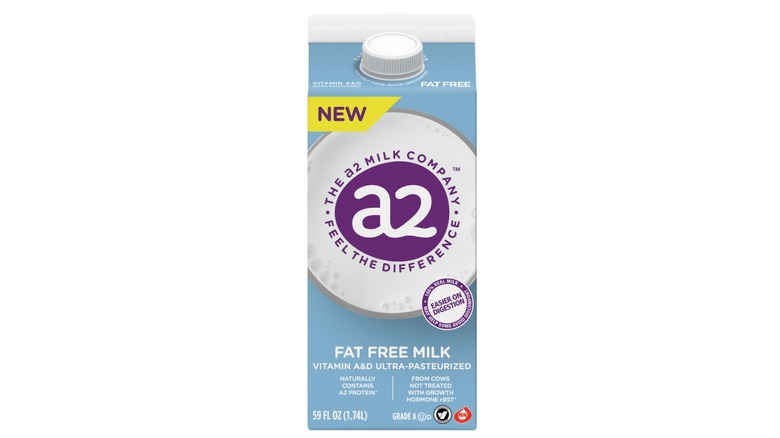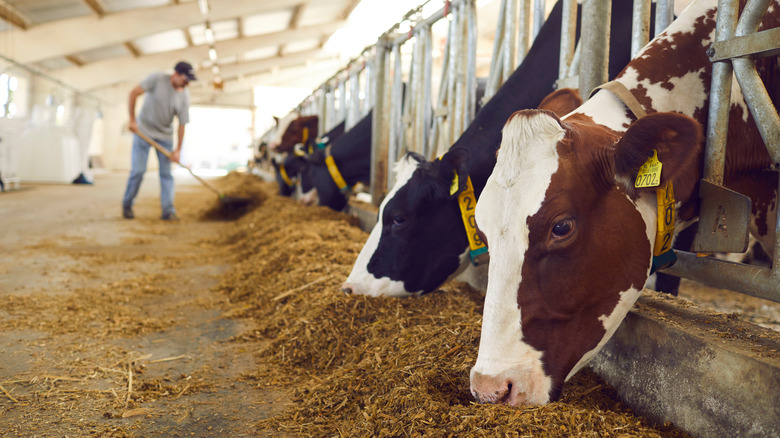What Exactly Is A2 Milk?
From oats and almonds to peas and soy, it seems like just about everything can be turned into milk these days. In fact, the one type of milk that seems to be falling out of fashion is regular old cow's milk, which dominated shelves until the non-dairy milk industry exploded in the early 2010s, according to UnivarSolutions.
There are a number of reasons dairy-free milk alternatives are having a moment in the sun. The number of Americans following a vegan diet are on the rise, increasing by a whopping 3000% over the last 15 years, which certainly accounts for some of their popularity, according to Live Kindly. However, plenty of meat-eaters also find themselves turning to dairy-free milk substitutes due to concerns about their health and nutrition. Although cow's milk has high amounts of calcium and protein, it's also fairly high in fat and sugar, so some people find themselves turning to lower-sugar, lower-fat plant milk, according to Harvard Health Publishing.
Finally, some people just find it hard to digest cow's milk, so they seek out non-dairy milks as a more tummy-friendly alternative. But not all cow's milk is created equally in this regard. Another variety of milk, called A2 milk, just might make it easier for those with dairy sensitivity to digest cow's milk.
A2 is a beta-casein found in cow's milk
When you drink a regular cup of cow's milk, you are also generally consuming A1 and A2, both types of beta-casein, "a protein that's found in all mammalian milk," Keith Woodford, an honorary professor at New Zealand's Lincoln University, explained to Bon Appétit. However, while beta-caseins are common in all milk, they don't all have the same effects on human digestion.
According to a 2015 study published in Nutrition Journal, the "digestion of A1 type can yield the peptide β-casomorphin-7," which has been linked to gastrointestinal distress in humans. Therefore, individuals who experience digestive issues and stomach troubles after drinking cow's milk may only be reacting primarily to the A1 beta-casein.
Consuming A2, however, did not result in similar gastrointestinal distress, meaning that drinking milk with only A2 proteins may be a more gut-friendly solution for those with milk sensitivity who don't want to abandon dairy milk entirely. The study concluded that "because elimination of A1 β-casein attenuated these effects, some symptoms of lactose intolerance may stem from inflammation it triggers, and can be avoided by consuming milk containing only the A2 type of beta casein."
Some cows primarily produce A2 milk
The distinction between A1 and A2 beta-caseins was first discovered by two scientists, Bob Elliott and Corran McLachlan, in 1993, according to The Atlantic. Extrapolating on this discovery, McLachlan partnered with an entrepreneur named Howard Paterson in 2000 to launch a brand-new, stomach-friendly kind of milk company, called The A2 Milk Company. Their goal was to develop and market A2 milk as a more stomach-friendly cow's milk option.
However, in the early days of agriculture, McLachlan's company would have been entirely unnecessary, because all cows naturally produced only A2. Due to what Woodford describes as a "remarkable anomaly," in more recent years a genetic anomaly has caused many different breeds of cattle to be more likely to produce A1 milk than A2 milk, according to Bon Appétit. Therefore, modern milk is more likely to upset one's stomach than a glass of milk might have in the past. However, certain breeds, such as Jersey and Guernsey cattle, continue to primarily produce high amounts of A2 milk.
In recent years, companies have capitalized on the increasingly diverse milk market to promote the health benefits of drinking A2 milk. And while the jury might still be out on how much more beneficial A2 milk may be overall, those who experience stomach sensitivity after drinking cow's milk might just want to give this more tummy-friendly version a try.


